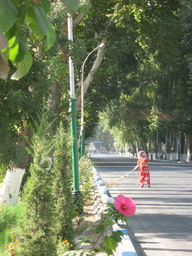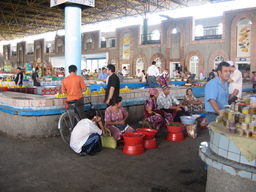
Street-Sweeper,
Fergana
 Street-Sweeper, Fergana |
My mood has lifted. I've found a pleasant city to unwind in: Fergana. Spending my last days here has let me relax and feel like exploring again.
Up until today I hadn't felt like my trip had begun. Even with four bonus days in the country, leaving China felt chaotic--I figured there was a fair chance my expired visa would cause some problem at the border, forcing me to turn around and head back to Urumqi. Once in Kazakhstan, my direction felt even more uncertain: I was dubious that I could get a visa to come to Uzbekistan without more hassle, expense, and wait than I was willing to put out.
Even after arrival in Tashkent I felt that I was still racing about, lining up the documents and paperwork for my next onward visas to countries beyond Uzbekistan. It's only now that I'm feeling like I've fallen back into the travel groove: curious to stroll about, visiting bazaars and museums, chatting with people.
I'm now in the Fergana Valley, a fertile region with long history. This was the birthplace Babur, founder of the Mogul Empire. Various strands of the Silk Road converged here, feeding from China through the Fergana Valley, into Samarkand. Cosmopolitan place that this once was, people throughout the valley today are more conservative than those back in Tashkent: the majority of women here wear long, colorful dresses and kerchief; I have yet to see one pair of shorts worn out on the street.
The Fergana Valley has suffered since the fragmentation of the Soviet Union. The region was diced up and parceled out among three newly independent countries. Imaginary and arbitrary lines drawn up decades prior by Moscow, as intangible and meaningless as lines of latitude or longitude, defined the republics of the U.S.S.R. Since independence these lines have solidified into true national borders. The domestic train from Tashkent to Andijan, two cities in Uzbekistan, must now transit in and out of Tajikistan to get from origin to destination. The ancient cities of Andijan and Osh, just down the road from each other, are now in two separate countries: Uzbekistan and Kyrgyzstan. Visa requirements and border crossings now divide routes which for centuries stood as the main road from here to there.
Two summers ago, I visited the jigsaw puzzle-piece of the Fergana Valley allotted to Kyrgyzstan. I found people friendly and welcoming in the city of Osh and the hills around Arslanbab so made it a point to see what this side of the valley had to offer on this trip . I started by heading off from Tashkent as far into the valley as I could, taking a shared taxi to the city of Andijan.
The shared-taxi system is common around all countries in this region. Getting to or getting around the Fergana Valley is becoming almost exclusively a matter of private enterprise. Rather than wait for slow, overcrowded, infrequent buses, private cars park outside the long-distance bus station or some other known pick-up point. The driver hustles up passengers, prices are negotiated, and--while more expensive than a bus would be--travelers head off as soon as the car is full, going more quickly and comfortably than the scarce public bus would allow.
When taking a shared-taxi, bargaining is obligatory. One of my pet peeves is getting grossly overcharged. I wouldn't mind paying a small amount more than what locals are paying. However, walking up and being quoted a fare to Destination X which is several times the going rate gets annoying quickly. It's frustrating: as an outsider it's hard to gauge what the right cost should be. Sometimes fares which sound like bargains turn out to be 5x too much, other times fares that sound expensive are indeed the going rate which everybody is paying. I've found it's best to "buy" a little information before setting off, stopping at some stall not far from the bus station, buying a cold bottle of water or Fanta. While sipping, I ask the proprietor where cars to my destination leave from and, more importantly, what the going rate is. As a disinterested third party they invariably quote me the lowest price a driver will eventually come down to.
Without that knowledge, it's impossible to bargain. The fare between Taskhent and Andijan is presently 10,000 som. Offering up, say--12,000 som--would only be an indication that you don't know the actual price: the driver will try to inflate the price much more aggressively. Immediately stating the right price, never wavering, then walking over to another car if the driver won't come down is the best way to conclude the negotiation quickly.
Since arriving in the Uzbekistan portion of the Fergana Valley I've spent most of my time in the city of Fergana itself. From Tashkent I went straightaway to the old city of Andijan, assuming that its status as one of the Valley's older, more historical cities would make it worth exploring. I found little of interest in the Andijan of today so set off the very next day, deciding to work my way back through the Valley slowly, eventually returning to Tashkent.
 Produce Sellers, Fergana Bazaar |
I'm taken by the diversity of the local population. There are more Russians still around Fergana than I had expected--I'd presumed that after the Soviet Union cracked up the only Russians left would remain on in Tashkent. I've seen the odd Korean around town, too. I vaguely recalled from history texts that Stalin exiled much of the Korean population from the area near Vladivostok, fearing the strength proximity to Korea might afford a secessionist movement. Thousands of ethnic Koreans were sent off to Central Asia: today's Kazakhstan, Kyrgyzstan, and Uzbekistan. I'm surprised to find that--several generations on--these communities have retained their Korean language and traditions of cooking. While staying at the Hotel Koreana back in Tashkent I presumed that the women running the place were recent arrivals looking for opportunity. After several days of broken Russian (on my part) and broken English (on their part) we found that we shared a common language in Uzbek. We chatted in much greater depth, it turned out that they had all been born and raised in Tashkent. Even out here in little Fergana, Korean restaurants are everywhere.
People are curious about me. I speak my version of Uighur: far from perfect. Even if I spoke standard Uighur flawlessly, I would still obviously be an outsider. All the same, even my attempts at Uighur are close enough to Uzbek that people have little trouble understanding. Wanting to know where I'm from, people hazard a guess. They invariably ask one word: "Turk?". It's probably a fair assumption that I come from Turkey--probably the only country with a Turkic language today which sends tourists beyond its borders. Finding that I'm instead from America brings a startled smile and further questions. I may tire of it, but at this stage I'm eager for conversation, trying to pick up the differences between the languages. I find it amusing that back on the streets of Urumqi what I most often heard was not, "Turk?", but, "Uzbek?". Everybody keeps presuming me to be from somewhere immediately west of where I am at the moment.
I would like to linger yet another day in Fergana, but think I'll be off tomorrow morning. Rian will be back in Tashkent tomorrow; I have more paperwork for onward visas I'd like to iron out. I'm planning to come back out to the Fergana Valley before ultimately leaving Uzbekistan, though think I'll continue on westward to see somewhere new after this stop in Tashkent. I remember decades ago, seeing a book on the shelf at my sister's house: The Golden Peaches of Samarkand. Picking the book up, I had only a vague idea what or where Samarkand might be. All the same, there was an immediate draw, the city's name alone was evocative and romantic. Knowing nothing, I somehow still associated Samarkand with distant, exotic lands and kingdoms past.
I should arrive in Samarkand within the week.